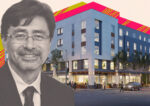Oakland was awarded $50 million from the state to develop affordable housing, and the city will be partnering with local nonprofit developers to complete projects.
The awards came through the California Housing Accelerator and the Local Housing Trust Fund programs. The Housing Accelerator funds affordable housing projects that, despite having received one or more awards from other HCD programs, are unable to move forward due to funding gaps.
The developments funded by these new awards will serve residents earning between 20 and 60 percent of area median income and will include 107 units of permanent supportive housing and social services at these locations provided by Abode Services.
There are two projects planned currently. The larger one is a 52-unit multifamily building at 801 Pine Street, which will be developed by East Bay Asian Local Development Corporation and Allied Housing. The second development will be located at 1904 Adeline Street and will feature 10 affordable units of senior housing and be developed by Community Housing Development Corporation & Friendship Community Development Corporation.
“The state’s accelerator program, leveraged by our city dollars, has unlocked our pipeline to meet Oakland’s most urgent housing needs,” Christina Mun, Oakland’s interim director of Housing & Community Development, said. “The state has mandated that we build over 14,000 affordable units over the next eight years to meet our Regional Housing Needs Assessment – Oakland is stepping up to that challenge by leveraging all of our resources and partnering with the state to respond to our housing needs.”
In a few weeks, Oakland will usher in a new city government that features a new mayor and two new councilmembers. All have made affordable housing, particularly for individuals experiencing homelessness, a priority.
Mayor-elect Sheng Thao pledged to build at least 30,000 new housing units in Oakland over the next eight years during the campaign. To meet that goal, Thao said she will provide expeditedl approval for zoning-compliant projects over 25 units, that are on non-toxic land, that employ union labor for construction and local hiring preferences, and that are either 100 percent affordable or mixed income projects with 15 percent affordable on-site units.
New Councilwoman Janani Ramachandran acknowledges that the city is below its targets for building low-income housing, and largely attributes this to funding gaps. She stated that neither the city’s general fund nor bond measures can provide sufficient funds, and that she would be an advocate for greater state and federal dollars to increase affordable housing programs, especially those focused on unhoused youth and seniors.
The other new council member, Kevin Jenkins, also believes the city has to look beyond its own resources to support affordable housing initiatives. Jenkins stated that he believes that the Bay Area housing crisis has to be solved at the county level. He is currently the director of housing justice initiatives at United Way Bay Area, where he said they work to improve access to affordable housing and homelessness prevention resources.
He endorsed the city’s 2022 Affordable Housing and Infrastructure Bond to pay for repairs to city streets and other public amenities like parks and buildings.
Read more



